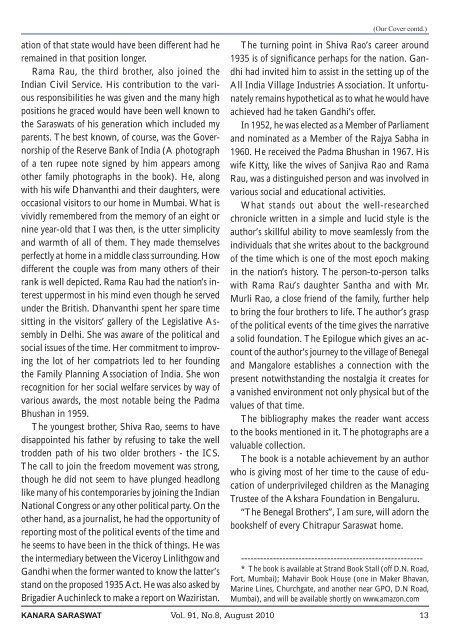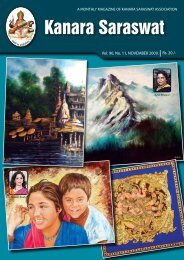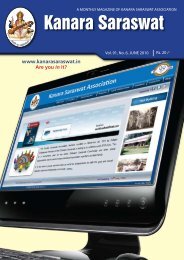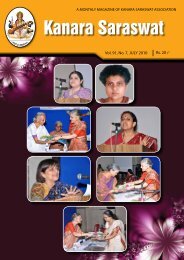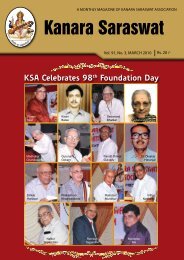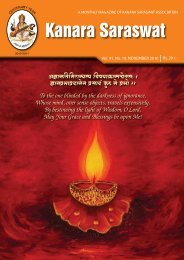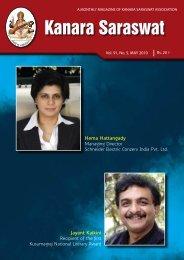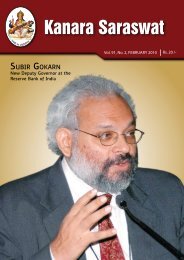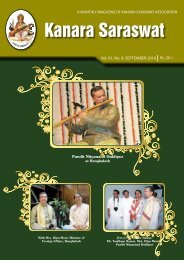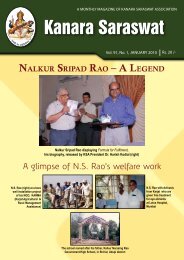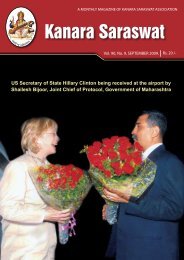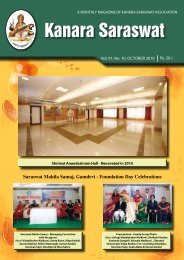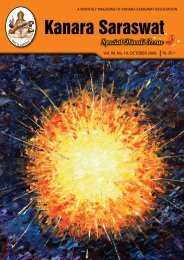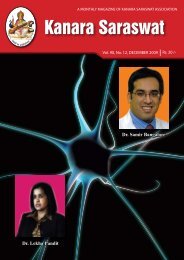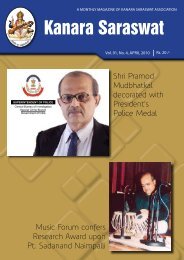You also want an ePaper? Increase the reach of your titles
YUMPU automatically turns print PDFs into web optimized ePapers that Google loves.
ation <strong>of</strong> that state would have been different had he<br />
remained in that position longer.<br />
Rama Rau, the third brother, also joined the<br />
Indian Civil Service. His contribution to the various<br />
responsibilities he was given and the many high<br />
positions he graced would have been well known to<br />
the Saraswats <strong>of</strong> his generation which included my<br />
parents. The best known, <strong>of</strong> course, was the Governorship<br />
<strong>of</strong> the Reserve Bank <strong>of</strong> India (A photograph<br />
<strong>of</strong> a ten rupee note signed by him appears among<br />
other family photographs in the book). He, along<br />
with his wife Dhanvanthi and their daughters, were<br />
occasional visitors to our home in Mumbai. What is<br />
vividly remembered from the memory <strong>of</strong> an eight or<br />
nine year-old that I was then, is the utter simplicity<br />
and warmth <strong>of</strong> all <strong>of</strong> them. They made themselves<br />
perfectly at home in a middle class surrounding. How<br />
different the couple was from many others <strong>of</strong> their<br />
rank is well depicted. Rama Rau had the nation’s interest<br />
uppermost in his mind even though he served<br />
under the British. Dhanvanthi spent her spare time<br />
sitting in the visitors’ gallery <strong>of</strong> the Legislative Assembly<br />
in Delhi. She was aware <strong>of</strong> the political and<br />
social issues <strong>of</strong> the time. Her commitment to improving<br />
the lot <strong>of</strong> her compatriots led to her founding<br />
the Family Planning Association <strong>of</strong> India. She won<br />
recognition for her social welfare services by way <strong>of</strong><br />
various awards, the most notable being the Padma<br />
Bhushan in 1959.<br />
The youngest brother, Shiva Rao, seems to have<br />
disappointed his father by refusing to take the well<br />
trodden path <strong>of</strong> his two older brothers - the ICS.<br />
The call to join the freedom movement was strong,<br />
though he did not seem to have plunged headlong<br />
like many <strong>of</strong> his contemporaries by joining the Indian<br />
National Congress or any other political party. On the<br />
other hand, as a journalist, he had the opportunity <strong>of</strong><br />
reporting most <strong>of</strong> the political events <strong>of</strong> the time and<br />
he seems to have been in the thick <strong>of</strong> things. He was<br />
the intermediary between the Viceroy Linlithgow and<br />
Gandhi when the former wanted to know the latter’s<br />
stand on the proposed 1935 Act. He was also asked by<br />
Brigadier Auchinleck to make a report on Waziristan.<br />
(Our Cover contd.)<br />
The turning point in Shiva Rao’s career around<br />
1935 is <strong>of</strong> signifi cance perhaps for the nation. Gandhi<br />
had invited him to assist in the setting up <strong>of</strong> the<br />
All India Village Industries Association. It unfortunately<br />
remains hypothetical as to what he would have<br />
achieved had he taken Gandhi’s <strong>of</strong>fer.<br />
In 1952, he was elected as a Member <strong>of</strong> Parliament<br />
and nominated as a Member <strong>of</strong> the Rajya Sabha in<br />
1960. He received the Padma Bhushan in 1967. His<br />
wife Kitty, like the wives <strong>of</strong> Sanjiva Rao and Rama<br />
Rau, was a distinguished person and was involved in<br />
various social and educational activities.<br />
What stands out about the well-researched<br />
chronicle written in a simple and lucid style is the<br />
author’s skillful ability to move seamlessly from the<br />
individuals that she writes about to the background<br />
<strong>of</strong> the time which is one <strong>of</strong> the most epoch making<br />
in the nation’s history. The person-to-person talks<br />
with Rama Rau’s daughter Santha and with Mr.<br />
Murli Rao, a close friend <strong>of</strong> the family, further help<br />
to bring the four brothers to life. The author’s grasp<br />
<strong>of</strong> the political events <strong>of</strong> the time gives the narrative<br />
a solid foundation. The Epilogue which gives an account<br />
<strong>of</strong> the author’s journey to the village <strong>of</strong> Benegal<br />
and Mangalore establishes a connection with the<br />
present notwithstanding the nostalgia it creates for<br />
a vanished environment not only physical but <strong>of</strong> the<br />
values <strong>of</strong> that time.<br />
The bibliography makes the reader want access<br />
to the books mentioned in it. The photographs are a<br />
valuable collection.<br />
The book is a notable achievement by an author<br />
who is giving most <strong>of</strong> her time to the cause <strong>of</strong> education<br />
<strong>of</strong> underprivileged children as the Managing<br />
Trustee <strong>of</strong> the Akshara Foundation in Bengaluru.<br />
“The Benegal Brothers”, I am sure, will adorn the<br />
bookshelf <strong>of</strong> every Chitrapur Saraswat home.<br />
---------------------------------------------------------<br />
* The book is available at Strand Book Stall (<strong>of</strong>f D.N. Road,<br />
Fort, Mumbai); Mahavir Book House (one in Maker Bhavan,<br />
Marine Lines, Churchgate, and another near GPO, D.N Road,<br />
Mumbai), and will be available shortly on www.amazon.com<br />
KANARA SARASWAT Vol. 91, No.8, <strong>August</strong> <strong>2010</strong> 13


